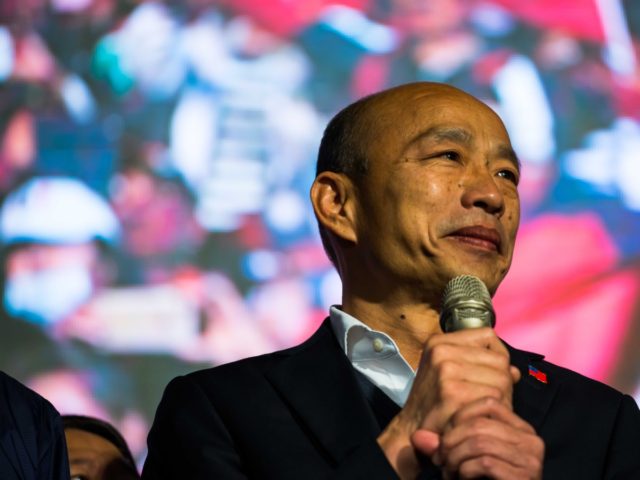Former pro-China presidential candidate Han Kuo-yu became the first mayor in the history of Taiwan to lose his job via recall this weekend. More residents of his city, Kaohsiung, voted to recall him than voted to elect him in 2018.
Han, a Kuomintang politician who ended a failed political career in Taipei before arriving in Kaohsiung in 2017, ran against popular incumbent President Tsai Ing-wen in January’s presidential election, which Tsai won commandingly. Tsai’s Democratic Progressive Party (DPP) advocates for confronting Chinese attempts to undermine the island nation’s democracy directly and eschews attempts to negotiate power with Beijing, which has never controlled Taiwan in history. The Kuomintang, or Nationalist Party, promotes closer ties to China and further dialogue with the Communist Party.
China considers Taiwan a rogue province rightfully under the command of the Communist Party, despite the lack of historical evidence that this has ever been Taiwan’s status. In addition to its democratic federal government structure, Taiwan’s institutions – military, schools, healthcare system, among other – operate entirely independently of China.
In October, in anticipation of the showdown between Han and Tsai and after reports surfaced of Communist Party officials desecrating the remains of Uyghur citizens in Xinjiang cemeteries, Chinese dictator Xi Jinping vowed that all who recognized Taiwan’s independence, or the autonomy of any other territory China illegally claims, would have their “bones ground to powder.”
A recall campaign began against Han in 2019, in the middle of his attempts to become president of the country. Residents protested that Han almost immediately began a presidential campaign after being elected mayor and routinely neglected municipal affairs in the interest of higher political ambitions.
“The groups are seeking to recall Han because he launched his presidential bid less than six months into his mayoral term and has not been paying any attention to running the Kaohsiung local government, according to Citizens Mowing Action, another petitioner,” Focus Taiwan reported at the time. “It said Han made bizarre and impractical promises during his campaign, has been constantly tripped up by gaffes and missteps, and is an incompetent absentee mayor.”
On Saturday, nearly one million people – and nearly 100,000 more than the number who elected him in the first place – voted to recall Han from the mayorship of Kaohsiung. Of the 2.3 million eligible voters, 929,090 voted to remove him from power, nearly double the number necessary for the recall motion to pass. According to the Taipei Times, the organizers of the recall movement made a call for unity in the aftermath of the vote, declaring “new life has come” to the city.
Voters will take to the polls on September 12 for a special election, giving the parties time to find candidates and campaign. Han is not allowed to run for any political position in the city for four years.
The Kuomintang, which has largely failed to maintain local power in the aftermath of the DPP’s rise to the presidency in 2016 – and the largely violent response to that phenomenon from China – publicly stated they believed Han would now take some time to reassess his career and the party would recalibrate its message to the public.
“Instead of being forced to articulate his plans going forward, Han should be given a chance to look back on his political rise and reflect on why he fell so fast and hard,” Chen Shei-saint, a former Kuomintang lawmaker, told Channel News Asia, calling Han “a major political asset” to the party.
The Chinese Communist Party is attempting to avoid Han’s recall being framed as a defeat for Beijing, given that the Party has for decades enjoyed a friendlier relationship with the Kuomintang than the DPP.
“The Chinese mainland [the legal territory of China] public are not paying much attention to the incident as they have become convinced in recent years that they cannot rely on the KMT [Kuomintang] for Taiwan reunification as the party increasingly wavers on reunification and fails to contain separatism on the island,” the Global Times, a Communist Party propaganda outlet, declared on Monday, citing “analysts.”
The Global Times declared Taiwan’s successful implementation of a democracy “political struggle and endless farces” and noted that dictator Xi Jinping had symbolically disavowed Kuomintang leader Chiang Chi-chen for being “pro-U.S.”
The Kuomintang faced tragedy shortly after Han’s recall with the news of the death of Hsu Kun-yuan, Kaohsiung’s city council speaker and a close ally of Han’s. According to Focus Taiwan, police said they believed that Hsu jumped to his death from his apartment on the 17th floor of a residential building at 8:45 p.m. on Saturday, shortly after the recall vote results were revealed. The news outlet reported that police were yet unsure about the cause of his death or if it was related to the election and were still investigating. Other news sources said that Hsu “fell” to his death.
Hsu had described the recall as “regrettable” shortly before his death.
Hsu’s death was met with shock and concern from both of Taiwan’s major parties.
“All loss of life is a mournful tragedy regardless of party affiliation,” Presidential Office spokesman Ting Yun-kung, who represents Tsai, told reporters on Monday, urging the Taiwanese public to avoid “controversial” comments that could add to the pain of the loss. Kuomintang Chairman Chiang had previously called on Tsai to urge her party not to celebrate or otherwise make untoward comments about Hsu’s death.
“Chiang was apparently referring to remarks made by DPP Taipei City Councilor Liang Wen-jie (梁文傑), who in a Facebook post made Saturday shortly after Hsu’s death, questioned whether it was connected to political gambling,” Focus Taiwan reported. Liang apologized for the speculation.

COMMENTS
Please let us know if you're having issues with commenting.